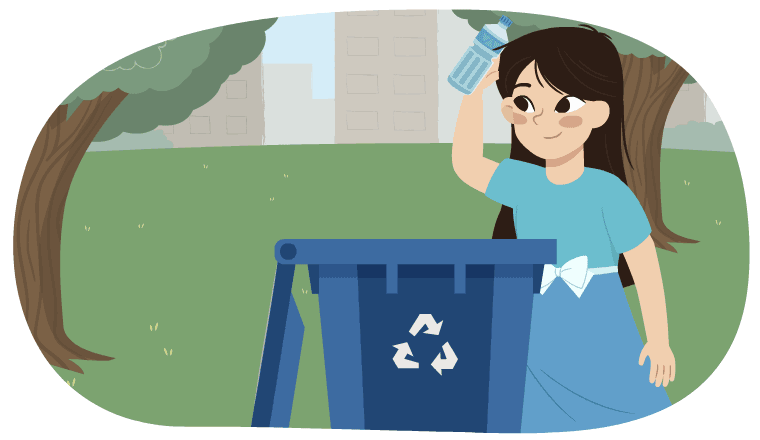Minds On
R is for recycling

What happens at the recycling depot? Many objects are made of one or more materials. It is important that the materials are sorted before they get to the depot.
When recycling, objects are sorted based on what materials they are made from.
Can you help sort some common items that are found in your school recycling bin?
Why is recycling important?
Describe your ideas using pictures, in writing, or create an audio recording. Share your ideas with a partner, if possible.
Action
Future impacts
This learning activity connects new and existing approaches for young scientists to create positive changes in their communities.

What are some of the challenges that make it difficult to recycle?
Press ‘Sample Answer’ to access some recycling challenges.
In some communities, recycling programs are not available or expensive to maintain. Many objects are not sorted properly and end up in landfills.
Education is an important part of the solution. Everyone needs to understand what objects can be recycled and how to sort and clean them properly. How can you help educate others about recycling?
Think about your school or neighbourhood. What are some of the challenges to recycling and sorting objects correctly? This is the information you will need to include in your instructions on how to recycle correctly. One problem in many schools is when containers are put in the recycling bin without being rinsed.
Let’s create a solution to this problem!
Explore
As you explore the layout of the classroom, think about how a student could:
- rinse their container
- get their container to the recycling bin
- get back to their spot

Review
What are some words we use when giving directions?
Press ‘Hint’ to access some words we use when giving directions.
They may include left, right, up or down, forward, backwards, over, under or other terms indicating direction.

Coding the steps through the classroom
Imagine you are sitting on the carpet. Can you put your container in the recycling bin? Make sure the container is rinsed first!

A classroom with desks, a whiteboard, a seating area, a sink, and a recycling bin. There are arrows pointing from the carpet to the sink, then to the recycling bin and then back to the carpet.
Use the following checklist to help you.
When organizing my steps, I…
Consolidation
Creating your own directions!

Someone has moved the paper recycling bin from the classroom all the way down the hall into the library!
Using the arrows provided, make your way from the classroom to the recycling bin. Describe the route you took using direction words. Is there another way to get there? Share your ideas with a partner, if possible.
I can make a difference!
I can make a difference by:
Recycling is one important way that humans can take action to help the environment.
Can you think of other ways you can make a difference?
How might we create less waste in the classroom and at home? Why are these actions important?
Describe your ideas using pictures, in writing, or as an audio recording. Share your ideas with your class or community, if possible.
Press ‘Possible Answer’ to access ideas of how you can make a difference.
At school, we can:
- bring reusable containers for water or snacks
- use both sides of the paper
- create art from recycled materials
At home, we can:
- sort and recycle objects correctly
- compost food waste, if possible.
Reflection
How do you feel about what you have learned in this activity? Which of the next four sentences best matches how you are feeling about your learning? Press the button that is beside this sentence.
I feel…
Now, record your ideas about your feelings using a voice recorder, speech-to-text, or writing tool.